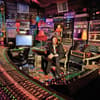Podcast
Questions and Answers
What is the primary responsibility of a monitor engineer?
What is the primary responsibility of a monitor engineer?
- To ensure the PA system is functioning properly
- To constantly monitor the performers' individual mixes (correct)
- To operate and maintain the FOH and monitor speakers
- To ensure the overall sound quality of the event
What is the typical voltage used to power most sound systems?
What is the typical voltage used to power most sound systems?
- 440 volts ac
- 230 volts ac (correct)
- 380 volts ac
- 110 volts ac
What is the main cause of electrical accidents in sound systems?
What is the main cause of electrical accidents in sound systems?
- Poor equipment maintenance
- Human error and negligence (correct)
- Inadequate electrical wiring
- Faulty electrical components
Who should approve electrical power installations in permanent or temporary setups?
Who should approve electrical power installations in permanent or temporary setups?
What is a crucial safety precaution when working with electrical equipment?
What is a crucial safety precaution when working with electrical equipment?
Flashcards are hidden until you start studying
Study Notes
Sound and Audio Engineering
- A live concert scene is described, with thousands of fans waiting in anticipation, and the sound engineer plays a crucial role in controlling the sound system.
- Sound can have multiple purposes, including communication, warning of danger, or providing an enjoyable experience.
Types of Audio Engineers
- There are three main types of audio engineers: Front of House (FOH), Monitor, and System Technician.
- FOH engineers mix audio for the audience and run soundchecks.
- Monitor engineers control sound on stage and pay attention to the performers' individual mixes.
- System technicians look after the PA system, including FOH and monitor speakers.
Safety in Sound Systems
- Sound systems can be hazardous if not installed, operated, and maintained properly.
- Malfunctioning components or faulty wiring can expose people to shock hazards, especially outdoors and in wet conditions.
- Electrical accidents can be avoided by following basic safety rules and paying attention to electrical safety guidelines.
Electrical Safety
- Electricity can be deadly and does not discriminate based on experience.
- Electrical accidents can be caused by human error, including:
- Negligence and incorrect wiring
- Lack of good Earthing termination
- Damage to electrical wiring and equipment
- Lack of regular maintenance checks
- Carelessness and unsafe operating procedures
- Incompetent or unqualified electrical persons
- Electrical safety guidelines include:
- All electrical work must be done by a suitably qualified person.
- Always switch off power and remove plugs before working on equipment.
- Keep electrical equipment in good working order through inspection and maintenance.
- Disconnect broken appliances and replace frayed cords or broken power points.
- Use test equipment correctly and read instruction booklets.
- Keep electrical cords off the floor to reduce the risk of damage.
- Know the location of the main electricity supply.
- Avoid mixing electricity with water.
Studying That Suits You
Use AI to generate personalized quizzes and flashcards to suit your learning preferences.





